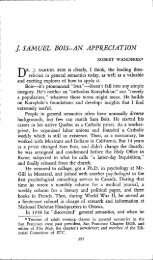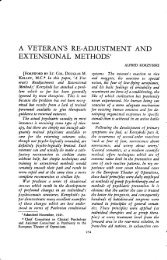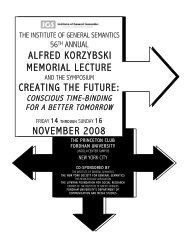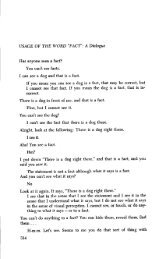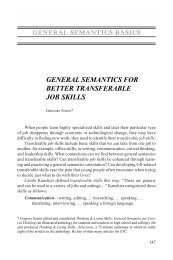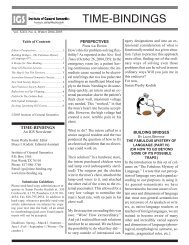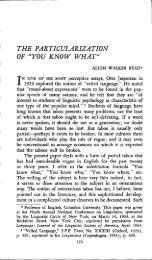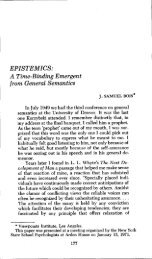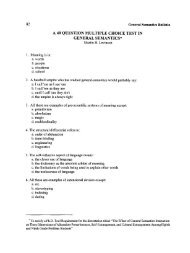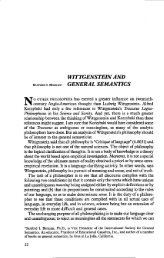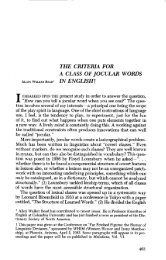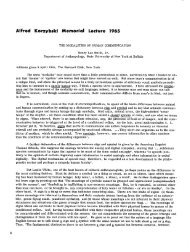Concerning an E-prime translation of the Bible. David F. Maas
Concerning an E-prime translation of the Bible. David F. Maas
Concerning an E-prime translation of the Bible. David F. Maas
You also want an ePaper? Increase the reach of your titles
YUMPU automatically turns print PDFs into web optimized ePapers that Google loves.
<strong>Concerning</strong> <strong>an</strong> E-<strong>prime</strong> tr<strong>an</strong>slation <strong>of</strong> <strong>the</strong> <strong>Bible</strong>.<br />
<strong>David</strong> F. <strong>Maas</strong><br />
When D. <strong>David</strong> Bourl<strong>an</strong>d, Jr., looks for possible sources <strong>of</strong> material to rewrite in E-Prime (English without<br />
<strong>the</strong> verb to be (1)), he cautiously refrains from touching religious documents because it "would<br />
unnecessarily affront some folks no matter what <strong>the</strong> source <strong>of</strong> <strong>the</strong> religious writing." (p.73) For some<br />
reason, when I read this caution it triggered some latent iconoclastic adventurous urge deep in my<br />
nervous system.<br />
A number <strong>of</strong> times <strong>David</strong> <strong>Maas</strong> has rushed in where Gabriel <strong>an</strong>d Michael may have expressed some<br />
timidity. Consequently, after <strong>the</strong> 1994 Ambassador University Invitational General Sem<strong>an</strong>tics Symposium,<br />
I systematically beg<strong>an</strong> to recast portions <strong>of</strong> <strong>the</strong> <strong>Bible</strong> into E-Prime versions. I, <strong>an</strong>d subsequently my<br />
students also, had <strong>an</strong> on-line N.I.V. tr<strong>an</strong>slation <strong>of</strong> <strong>the</strong> <strong>Bible</strong> available. From <strong>the</strong> very beginning we tried to<br />
keep in mind Bourl<strong>an</strong>d's warning that "You c<strong>an</strong>not say that in E-Prime," for such tr<strong>an</strong>slation inevitably<br />
ch<strong>an</strong>ges <strong>the</strong> "me<strong>an</strong>ing."<br />
I went through verses, electronically eliminating constructions involving forms <strong>of</strong> to be <strong>an</strong>d replacing<br />
<strong>the</strong>m with italicized E-Prime alternatives. Consequently, by August <strong>of</strong> 1994 I had <strong>the</strong> first drafts <strong>of</strong><br />
Psalms <strong>an</strong>d Proverbs Proverbs, book <strong>of</strong> <strong>the</strong> <strong>Bible</strong>. It is a collection <strong>of</strong> sayings, m<strong>an</strong>y <strong>of</strong> <strong>the</strong>m moral<br />
maxims, in no special order. The teaching is <strong>of</strong> a practical nature; it does not dwell on <strong>the</strong> salvationhistorical<br />
traditions <strong>of</strong> Israel, but is individual <strong>an</strong>d universal based on <strong>the</strong> rewritten in E-Prime. The<br />
Psalms seemed particularly amenable to this effort. Several <strong>of</strong> <strong>the</strong> Psalms (e.g., 98, 114, 136, <strong>an</strong>d 150)<br />
already appeared in E-Prime in <strong>the</strong> N.I.V. tr<strong>an</strong>slation. Undoubtedly this circumst<strong>an</strong>ce resulted from <strong>the</strong><br />
fact that Hebrew does not use <strong>the</strong> copula .<br />
The Epistles <strong>of</strong> Paul in <strong>the</strong> New Testament gave me much greater difficulty, but I thoroughly enjoyed<br />
<strong>the</strong> challenge <strong>of</strong> ch<strong>an</strong>ging some <strong>of</strong> those convoluted sentences into crisper forms. By <strong>the</strong> time <strong>the</strong><br />
spring semester arrived <strong>an</strong>d I again faced my General Sem<strong>an</strong>tics class, I had completed a rough draft <strong>of</strong><br />
<strong>the</strong> Epistles <strong>of</strong> Paul in E-Prime. I asked my general sem<strong>an</strong>tics class to help me (as a class project) to<br />
complete <strong>an</strong> E-Prime revision <strong>of</strong> <strong>the</strong> entire N.I.V. tr<strong>an</strong>slation <strong>of</strong> <strong>the</strong> <strong>Bible</strong>.<br />
I parceled out uniformly-sized portions <strong>of</strong> <strong>the</strong> Old <strong>an</strong>d New Testaments to <strong>the</strong> nineteen students <strong>of</strong> my<br />
class. I challenged <strong>the</strong>m to have <strong>the</strong>ir parts ready by April, <strong>the</strong> meeting date for our Spring Symposium,<br />
at which time I w<strong>an</strong>ted to present a copy <strong>of</strong> <strong>the</strong> complete work to <strong>David</strong> Bourl<strong>an</strong>d. Unfortunately, we did<br />
not meet that deadline, but as I write this report we have reached <strong>the</strong> 96.777% mark. I hope to finish <strong>the</strong><br />
rough draft <strong>of</strong> <strong>the</strong> entire N.I.V. <strong>Bible</strong> soon. [Update : I worked independently on a<br />
different version from February 23- to September14,2009, completing <strong>an</strong><br />
E-Prime rendition <strong>of</strong> <strong>the</strong> New Americ<strong>an</strong> St<strong>an</strong>dard <strong>Bible</strong>]<br />
Last spring at <strong>the</strong> conclusion <strong>of</strong> <strong>the</strong> 1995 Ambassador University General Sem<strong>an</strong>tics Invitational<br />
Symposium, I gave a brief summary <strong>of</strong> my reflections on this project, touching upon grammatical,<br />
rhetorical, epistemological <strong>an</strong>d <strong>the</strong>ological insights this class effort produced. I will present here a slight<br />
elaboration <strong>of</strong> that summary.
We touched first upon <strong>the</strong> aes<strong>the</strong>tic or cosmetic aspects <strong>of</strong> E-Prime. Composition teachers <strong>an</strong>d<br />
magazine editors have complained interminably about <strong>the</strong> colorless <strong>an</strong>emic, baggy, passive voice. The<br />
words <strong>of</strong> <strong>the</strong> Apostle Paul take on a refreshing crispness when <strong>the</strong> use <strong>of</strong> E-Prime launders <strong>the</strong> passive<br />
voice out <strong>of</strong> <strong>the</strong>m:<br />
N.I.V. Gal. 3:19 ... The law was put into effect through <strong>an</strong>gels by a mediator.<br />
E-Prime N.I.V. Gal. 3:19 ... A mediator put <strong>the</strong> law into effect through <strong>an</strong>gels.<br />
In this passage <strong>the</strong> number <strong>of</strong> words remains <strong>the</strong> same, but <strong>the</strong> crispness <strong>of</strong> <strong>the</strong> E-Prime N.I.V. version<br />
seems to sparkle in comparison with <strong>the</strong> regular N.I.V. version. Of necessity, <strong>the</strong> agents involved appear<br />
in <strong>the</strong> second version.<br />
Often <strong>the</strong> E-Prime version will use even fewer words, by eliminating <strong>the</strong> superfluous ones:<br />
N.I.V. Rom. 7:21 ... When I w<strong>an</strong>t to do good, evil is right <strong>the</strong>re with me.<br />
E-Prime N.I.V. Rom. 7:21 ... When I w<strong>an</strong>t to do good, evil accomp<strong>an</strong>ies me.<br />
The pesky placeholder sometimes known as <strong>the</strong> expletive (e.g., <strong>the</strong>re, it) adds m<strong>an</strong>y additional words.<br />
The E-Prime emphasis on <strong>the</strong> agent gets rid <strong>of</strong> much <strong>of</strong> such added baggage:<br />
N.I.V. Rom. 3:12 ... There is no one who does good, not even one.<br />
E-Prime N.I.V. Rom. 3:12 ... Not even one does good.<br />
The E-Prime emphasis helps one to move away from static constructions <strong>an</strong>d verbals toward process<br />
verbs, away from adjectives to adverbs. The use <strong>of</strong> E-Prime encourages one to use a wider variety <strong>of</strong><br />
verbs that c<strong>an</strong> readily replace <strong>the</strong> overused forms <strong>of</strong> to be:<br />
N.I.V. Psalm 119:150 ... Those who devise wicked schemes are near, but <strong>the</strong>y are far from your law.<br />
E-Prime N.I.V. Psalm 119:150 ... Those who devise wicked schemes draw near, but <strong>the</strong>y drift far from<br />
your law.<br />
E-Prime tr<strong>an</strong>slations tend to emphasize process. Consequently, adverbs seem frequently to replace<br />
adjectives:<br />
N.I.V. Psalm 144:8 ... whose mouth are full <strong>of</strong> lies, whose right h<strong>an</strong>ds are deceitful.<br />
E-Prime N.I.V. Psalm 144:8 ... whose mouths tell lies, whose right h<strong>an</strong>ds act deceitfully.<br />
A selection <strong>of</strong> verbs st<strong>an</strong>d ready to re<strong>an</strong>imate previously embalmed verbals:<br />
N.I.V. Isa. 6:9 ... [<strong>the</strong>y may] be ever seeing but never<br />
perceiving, <strong>an</strong>d ever hearing but never underst<strong>an</strong>ding<br />
E-Prime N.I.V. Isa. 6:9 ... that <strong>the</strong>y may continually see but not perceive, <strong>an</strong>d continually hear but never<br />
underst<strong>an</strong>d.<br />
E-Prime encourages one to search out <strong>an</strong>d identify <strong>an</strong> agent. Even <strong>the</strong> Deity may return explicitly as a<br />
role player:<br />
N.I.V. Psalm 1:1 ... Blessed is <strong>the</strong> m<strong>an</strong>
E-Prime N.I.V. Psalm 1:1 ... God blesses <strong>the</strong> m<strong>an</strong> ...<br />
The E-Prime version <strong>of</strong> <strong>the</strong> epistles <strong>of</strong> Paul returns <strong>the</strong> responsibility for behavior back upon hum<strong>an</strong>s<br />
ra<strong>the</strong>r th<strong>an</strong> on some specter-like forces beyond <strong>the</strong>ir control. Consequently, <strong>the</strong> emphasis in E-Prime<br />
moves away from people as helpless victims <strong>an</strong>d more toward <strong>the</strong> roles <strong>of</strong> hum<strong>an</strong>s as responsible<br />
agents:<br />
N.I.V. Rom. 6:17... though you used to be slaves to sin ...<br />
E-Prime N.I.V. Rom. 6:17... you used to enslave. yourselves to<br />
sin ...<br />
N.I.V. Rom. 6:20 ... When you were slaves to sin, you were<br />
free from <strong>the</strong> control <strong>of</strong> righteousness ...<br />
E-Prime N.I.V. Rom. 6:20 ... When you enslaved yourselves<br />
to sinful behavior, you separated yourselves from righteous<br />
behavior.<br />
Even though <strong>the</strong> wom<strong>an</strong> Paul described in 1 Cor. 7:29 would certainly not claim to support women's lib,<br />
she makes a free choice that would probably please Dr. Laura Schlesinger, a contemporary advice<br />
dispenser:<br />
N.I.V. 1 Cor. 7:39 ... A wom<strong>an</strong> is bound to her husb<strong>an</strong>d as<br />
long as he lives. But if her husb<strong>an</strong>d dies, she is free to marry<br />
<strong>an</strong>yone she wishes...<br />
E-Prime N.I.V. 1 Cor. 7:39 ... A wom<strong>an</strong> binds herself to her<br />
husb<strong>an</strong>d as long as he lives. But if her husb<strong>an</strong>d dies, she<br />
has become free to marry <strong>an</strong>yone she wishes...<br />
The discipline <strong>of</strong> writing in E-Prime encourages <strong>the</strong> writer (or speaker) to admit to <strong>the</strong> subjectivity <strong>of</strong> his<br />
or her perceptions:<br />
N.I.V. 1 Cor. 9:16 ... Yet when I preach <strong>the</strong> gospel, I<br />
c<strong>an</strong>not boast, for I am compelled to preach.<br />
E-Prime N.I.V. 1 Cor. 9:16 ... Yet when I preach <strong>the</strong><br />
gospel, I c<strong>an</strong>not boast, for I feel compelled to preach.<br />
Certain motor behaviors which appear to consist <strong>of</strong> ghostly, e<strong>the</strong>real as essence:<br />
N.I.V. Rom. 3:9 ... We have already made <strong>the</strong> charge that Jews<br />
<strong>an</strong>d Gentiles alike are all under sin.<br />
E-Prime N.I.V. Rom. 3:9 ... What shall we conclude, <strong>the</strong>n? Do we<br />
behave <strong>an</strong>y better? Not at all! We have already made <strong>the</strong> charge<br />
that both Jews <strong>an</strong>d Gentiles have sinned.<br />
When reified essences become converted back to motor behaviors <strong>an</strong>d neurological processes, hum<strong>an</strong><br />
behavior seems somewhat more controllable. Recently I heard one <strong>the</strong>ologi<strong>an</strong> describe sin
metaphorically as pollen dust on a windshield. Unfortunately, this metaphor does not have much<br />
productivity in helping us to modify aberr<strong>an</strong>t "thought" patterns. Without E-Prime, motor behaviors which<br />
we c<strong>an</strong> potentially shape <strong>an</strong>d modify may become described as set <strong>an</strong>d hardened traits. E-Prime helps<br />
us to turn such traits back into behavior by perceiving <strong>the</strong>m as such:<br />
N.I.V. 1 Cor. 5:10 ... not at all me<strong>an</strong>ing <strong>the</strong> people <strong>of</strong> this world<br />
who are immoral or <strong>the</strong> greedy <strong>an</strong>d swindler .<br />
E-Prime N.I.V. 1 Cor. 5:10 ... not at all me<strong>an</strong>ing <strong>the</strong> people <strong>of</strong><br />
this world who act immorally or greedily or who swindle<br />
commit idolatry<br />
N.I.V. Rom. 7:7... What shall we say <strong>the</strong>n? Is <strong>the</strong> law sin?<br />
Certainly not! Indeed I would have not known what sin was<br />
except through <strong>the</strong> law.<br />
E-Prime N.I.V. Rom. 7:7 ... What shall we say, <strong>the</strong>n? Does<br />
keeping <strong>the</strong> law equate to sin? Certainly not! Indeed, I would not<br />
have known how to covet <strong>an</strong>d how not to covet except through<br />
<strong>the</strong> law.<br />
In converting descriptions <strong>of</strong> static traits to descriptions <strong>of</strong> process behaviors, we may eliminate <strong>the</strong><br />
hopeless feeling that a perceived character trait must remain perm<strong>an</strong>ent.<br />
Of course <strong>the</strong> use <strong>of</strong> E-Prime will not necessarily relieve a signific<strong>an</strong>t amount <strong>of</strong> religious conflict, but it<br />
could aid our efforts to neutralize <strong>the</strong> ra<strong>the</strong>r pervasive neurolinguistic distortions that we naively bring<br />
upon ourselves through faulty evaluation.<br />
(1.) For provocative articles <strong>an</strong>d discussion <strong>of</strong> E-Prime see To Be or Not: An E-Prime An Anthology, <strong>an</strong>d<br />
More E-Prime: To Be or Not 11, both published by ISGS .<br />
<strong>David</strong> F. <strong>Maas</strong> holds <strong>the</strong> position <strong>of</strong> Pr<strong>of</strong>essor <strong>of</strong> English at Ambassador University, Big S<strong>an</strong>dy, Texas r. .<br />
COPYRIGHT 1995 Institute <strong>of</strong> General Sem<strong>an</strong>tics<br />
No portion <strong>of</strong> this article c<strong>an</strong> be reproduced without <strong>the</strong> express written permission from <strong>the</strong> copyright holder.<br />
Copyright 1995, Gale Group. All rights reserved. Gale Group is a Thomson Corporation Comp<strong>an</strong>y.<br />
[ Currently <strong>David</strong> F. <strong>Maas</strong> holds <strong>the</strong> position <strong>of</strong> Pr<strong>of</strong>essor <strong>of</strong> English at Wiley College in Marshall Texas,<br />
<strong>an</strong>d regularly teaches courses in General Sem<strong>an</strong>tics, Linguistics, Literature <strong>an</strong>d Composition]



